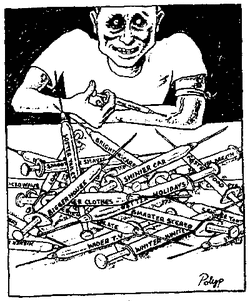While perusing Netflix a few nights ago, I stumbled across an indie film entitled, "The Queen of Versailles." Weighing in at 1 hr and 40 minutes, this 2012 award-winning documentary really packed a punch.
The film depicts (then) 70-year-old billionaire David Siegel, the Founder and CEO of a large time share empire, and his 42-year-old-former-Mrs.-Florida-wife, Jackie. Together, with their fleet of children, pets, drivers, housekeepers, and nannies, the couple endeavors to build the country's largest residential dwelling. Modeled after its namesake, the 90,000- square-foot home (pictured below), boasts its own bowling alley, several indoor swimming pools, ten kitchens, multiple bedrooms and bathrooms, and even a 5000-square-foot closet.
the lavish parties, private jets, private schools, etc.--came to a screeching halt. Construction on Versailles ceased and the family's flagship home sailed into foreclosure.
A few years after the film debuted, the economy recovered. Siegel was able to salvage the remnants of both his business and his mansion (Versailles is reportedly due to be completed this year). He could not, however, save his 18-year-old daughter, Victoria, who succumbed to a heroin overdose in her parents' home on June 6, 2015. The film was popular, not only because it offered us a peek into the lives of the very wealthy (about which many are naturally curious), but because it examines why, swathed in abundance, so many of us are compelled to seek more. People tend to assume they should feel happy most or all of the time. So, when we experience normal dark emotions, like boredom, sadness, shame, longing, or loneliness, we believe them to be an indication of our deficiency. Into the void we shovel substances, work, people, money, sex, material objects, etc. hoping they will provide us relief. We may even feel better for a little while. But novelty's "high" eventually wears off and, when it does, we seek to recapture it with bigger, better, and more. The wise part of us knows that seeking validation in external things is a fool's errand. But that doesn't stop us from trying. Many of us would rather chew off our arms than sit, even for a moment, with boredom, sadness, shame, longing, or loneliness. People often consult me because they are plagued by too much of something: depression, food consumption, substance abuse, work, etc. What they are often surprised to find is that overindulgence in one area is a signpost for perceived scarcity in another. For example, depression is not the result of too much sadness, it is what happens when we do not trust ourselves to fully experience sadness (without allowing it to consume our lives). The harder we work to suppress dark emotions, the more prominent they become. Filling the void with external things only reinforces that there is something to escape. We all posses a void, the size and shape of which is contingent upon our life experiences. Seeing the void for what it is--a bout of temporary dark feelings--tips us gently toward the light. If you are currently grappling with the void, here are four things to remember: 1. Beauty: In dark times, it is easy to forget that beauty exists. But it does. Everywhere. Need a reminder? Go outside and find something that occurs in the natural world. Study it closely. Take it in with as many senses as you can. You'll be amazed. 2. Gratitude: Make a daily list of at least three things for which you are grateful. The simpler, the better. It sounds corny but it really helps. Why? Think of Gratitude and Joy as your two favorite aunties who live in a duplex with an adjoining door. When you visit one, it is highly likely you will run into the other. Gratitude reminds us we are capable of joy. 3. Worthiness: Though we may feel least deserving of love in our lowest moments, it is then we most need it. We all possess a groundswell of love inside of us. You may not recognize yours right now, but it's there. You can--you will--access it. It's okay if you don't know how to do this. According to Melody Beatty, "H.O.W." stands for "Honesty, Openness, and the Willingness to try." With these three things on board, you're all set. The rest will figure itself out. 4. Acceptance: Try to accept that you will never find satisfaction in bigger, better, or more because they do not address the source of your hunger. Most of us simply long to know that we are okay. We are always okay, in the absence of external validation, even when we don't feel okay. I am often asked by people how long they will be in pain. Typically, my answer is "as long as." We cannot schedule an end date for our feelings. We can simply set a conscious intention to love ourselves through them. The void may never fully go away. This not an indication of deficiency; it is a byproduct of living. We are all doing our best to manage the void as it comes. Replacing the quest for bigger, better, or more with our own patience and love, over time, helps it diminish. If managing the void on your own is no longer working, it could be time to email me for a free consultation. Life can get pretty tough--you don't have to do it alone!
Dr. Jill Gross is a licensed psychologist, dating coach, and writer. She offers dating consultation and counseling services in Seattle, WA.
Sign up for great monthly personal growth-related content here:
0 Comments
Ever since my first child started kindergarten nine years ago, I have dreaded the end of each school year. It starts in mid-April with a pinch of maudlin, a dash of preoccupation with the future, and, much to my children's chagrin, a rampant compulsion to take a ridiculous amount of pictures. The whole process ends in June with full-on weeping at inopportune moments and, of course, more pictures.
This time of year is a sentimental stew of sadness, hope, trepidation, and excitement. Not to mention exhaustion. Every year I know it's coming. Every year it catches me off-guard. Though the early morning awakenings, hurried breakfasts, haphazardly assembled lunches, and mountains of homework take their toll on our sanity, they are also indicators that, each day for seven hours, my children have somewhere to be and something to do (that I did not have to plan for them). I also know that, at 3:00 PM, they will saunter through the door in search of a sympathetic ear in which to pour the news of the day. And snacks. I secretly take comfort in the routine of the school year because, on some level, it sweeps from my consciousness the awareness that time is passing and everything is temporary--even children. Though I knew this from the very beginning, intellectual knowing and experiential knowing are entirely different things. The latter always takes my breath away. Here are four things you may be noticing this time of year: 1. It goes fast. Prior to becoming a parent, I thought this was just mindless cocktail drivel. Once I had children, Monday became Friday. Friday became Christmas. Christmas became Spring Break. Spring Break became Summer. Like cartoon calendar pages, the weeks and months continue to fall away into the wind, one right after the other, faster and faster, until, one day, your baby appears before you in a cap and gown. It is as if we are all aging in dog years. The little boys and girls with whom my daughter went to kindergarten, just last week, must have slipped into some kind of hormonal time machine. The ones I don't see very often, with their deep voices, towering heights, and pimples, are no longer recognizable. This must be why, when I do see them, like a good little old person, I am compelled to blather on about how much they've grown. Because teenagers really do love that. Except they don't. But I still do it anyway. Impulse control is the first thing to go, apparently. 2. Social media makes you feel old. News feeds, once peppered with birth announcements and photos of sweet, sudsy bathtub babies have been overtaken by graduation announcements, prom selfies, and college acceptance letters. Wait a second. Didn't we just wean those babies, like, yesterday? 3. You may feel crazy (but you are not crazy). Watching children grow stirs so many mixed emotions. With each developmental milestone, we must let go of what is no longer needed so that we may encounter what is ahead. Yet there is an inexplicable desire to hold tightly with one hand what we are attempting to release with the other. It is normal and sometimes necessary to experience a mixed bag of feelings as we loosen our grip. This does not make us crazy; it makes us human. 4. Guilt and regret come with the territory. You may be beating yourself up for the soccer game(s) missed, the field trips you didn't chaperone, the Halloween costumes you didn't sew. Guilt comes from a sense of wrongdoing and regret is our mind's way of trying to convince us we knew better when we really did not. Fortunately, our relationships with our children consist of so much more than the incidents about which we feel guilty or regretful which, I assure you, are probably not really all that bad. We all did and are doing our best. And this is enough. Afford yourself the same grace you would afford others. As parents, we are meant to put ourselves out of a job, yet nothing prepares us for the bittersweetness of witnessing a job well done. As this school year draws to a close, remember that your emotions are merely a sign that something important is happening. Take a moment to grieve for what is lost, lean into what is coming, and, perhaps most importantly, take lots of pictures. Dr. Jill Gross is a licensed psychologist, dating coach, and writer. She offers dating consultation and counseling services in Seattle, WA.
For blog post updates and exclusive personal growth-related content, sign up for my monthly newsletter!
As a therapist, I often hear many different versions of, "If my partner/friend/family member would do more of this or less of that, I would be SO MUCH happier." Seems many of us believe the road to contentment is paved with another's intentions. When a loved one's behavior is overtly destructive, would a change likely do everyone some good? Sure. However, when we focus exclusively on someone else's motivations or actions, we forfeit our own power to affect change. A pointed finger merely identifies the person to whom we have relinquished it. Emotionally intense (heated) and/or familiar (repeated) arguments hold the key to identifying and resolving the childhood wounds that obstruct intimacy. The heated and repeated words we speak are usually (a) the words we needed to say at the time the wound was created (but we were too small or vulnerable to speak them), (b) what we most needed to hear from the person or people who initially hurt us, or (c) the words we are speaking about and for ourselves. Each time we notice and respond lovingly to our words in the present moment, we move toward healing the past. Each repetitive argument is life's way of asking us to clear the obstacles that keep us from loving more freely. Partners cannot clear these obstacles for us; we must do it ourselves. I know; I've been there. I once struggled in a relationship with someone who did not know how to respectfully treat others. After months of fruitless pleas for him to change, I realized I was the one who was being disrespectful: of him by expecting he morph into someone he wasn't and of myself for ignoring my own words. It was I who had to change. Over time, I came to appreciate how choosing an unhealthy relationship was a necessary part of learning to respect myself. Had I continued to direct my energy toward someone else's behavior, this lesson would have been missed entirely. The next time you find yourself shouting something you've said more than three times, I encourage you to accept life's invitation. Listen to your words. Love yourself by respecting your own words. Your words are a testament to your strength. Your words will tell you everything you need to know. Your thoughts? Dr. Jill Gross is a licensed psychologist, therapist, and counselor. She offers grief therapy, divorce support, and other counseling services in the Phinney Greenwood area of Seattle, WA. Feeling worn down by your own heated and repeated arguments? Schedule a free consultation to find out what these arguments may be trying to teach YOU!  " "If you rid of all your baggage you will likely float away. But you can't know beauty if you don't know pain." - Craig Minowa Like exit signs on a highway, our emotions are meant to come and go. Most of us want pleasant feelings to last forever, while we fear painful ones will never go away. Unfortunately, good feelings are not meant to last. Fortunately, bad ones aren't either! Like the weather, our emotional states are in constant flux. The more we are willing to be with painful feelings as they arise, the faster they resolve themselves.
So how do we do this? Every dark feeling has a voice. Each voice tells a story. Each story feels real but is not true. Identifying the stories of your dark emotions without interpreting them as facts about yourself is a crucial step toward unconditional self-love. So what are some of the dark emotions and how can you recognize them? Let's take a look: 1. Fear: Fear usually keeps our minds occupied with infinite questions or statements that start with "What if." Like a hamster on a wheel, we travel the cul-de-sac of worry hoping, this time, it will lead somewhere different. I like to think of worry as the mind's innocent way convincing itself it can prevent bad things from happening. I have yet to witness a tragedy preempted by worry, but I have seen it rob plenty of joy in the present moment. There is no such thing as a fearful person; only a person who feels fear. 2. Self doubt: Self-doubt is often the conclusion we draw as a result of fear. We are faced with something unfamiliar, we feel afraid, and, sometimes tell ourselves we simply cannot do it. Fear and self-doubt are constant traveling companions: where you find one, you find the other. When we are afraid, it is hard to trust our capability. There is no such thing as a an incapable person; only a person who feels self-doubt. 3. Hopelessness: Our own personal harbinger of doom, hopelessness suggests it is pointless to try anything because nothing will work. Keep an ear out for "always" and "never" (e.g., "Things will never change." or, "I will always feel this way."). These are signs hopelessness is on board. Try and remember that wherever you are is just a stop along the highway; it will pass. There is no such thing as a hopeless person; only a person who feels hopeless. 4. Guilt: Guilt shows up on the scene when we believe we have done something wrong. It beckons us to look closer at how we are behaving but it is not always an indication of wrongdoing. The next time you notice yourself thinking or saying, "I feel badly about...," ask yourself if you are willfully disrespecting yourself, your fellow humans or their personal property. If so, then let guilt be the impetus for changing your behavior. If not, you've suffered enough. Consider forgiving yourself for whatever it is you are telling yourself you could or should have done differently. There is no such thing as a guilty person; only a person who feels guilty. 5. Regret: Regret is predicated on the impossible: the ability to undo what's been done. It assumes we could have or should have known better. Pay attention to the next time you start a thought or sentence with, "If only I..," or "What was I thinking?" Replace these statements with, "I did the best I could with the information I had when I decided [insert your choice here]. I learned from this decision. I choose to move forward by letting go of all regret associated with this choice." There is no "better." Even when it brings us hardship, every choice is a learning opportunity. Each prior action has helped you become the person you are now. In this moment, exactly as you are, you are worthy of your own love and acceptance. There is no such thing as a regretful person; only a person who feels regret. 6. Envy: Envy is meant to focus our attention on what is missing from our lives. It burns as we witness someone else manifesting things we want but don't have. It is often met with guilt and dismissed with judgment: "It is wrong to feel this way when something good happens to someone I love." Acknowledge envy without allowing yourself to act upon it in an unloving way. Sharing in others' joy will generate more of your own. There is no such thing as an envious person; only a person who feels envy. 7. Jealousy: Jealousy is the child inside who divides the world into factions of "mine" and "not mine." He feels threatened when he sees his "possessions" allotted to another. This child needs only to be reminded there is plenty of love to go around. Though we often feel least deserving of loving reassurance when we feel jealous, this is actually a time when we most need it. There is no such thing as a jealous person; only a person who feels jealousy. 7. Shame: Shame tells us seductive stories about our value: we are not this enough, we are too that, or why can't we be different altogether? No dark emotion runs quite as deep as shame. Its roots extend back to a time we were made to feel insignificant by people who were supposed to love and accept us. Shame is a skilled orator--it spins a sticky and convincing web of lies about our worth. Don't believe these lies! You are worthy. You are deserving. You are lovable. There is no such thing as a shameful person; only a person who feels shame. All emotions deserve a sympathetic and loving ear. Hold your dark emotions with an open hand and, like the others, they will pass. We are not what we feel. Dark emotions are merely indicators of our aliveness: we must know darkness to fully live in the light. Your thoughts? Dr. Jill Gross is a licensed psychologist, therapist, and counselor. She offers grief therapy, divorce support, and other counseling services in the Phinney Greenwood area of Seattle, WA. Having trouble managing your dark emotions? Schedule a free consultation to find out how therapy or counseling can help you feel better! |
AuthorDr. Jill Gross is a licensed psychologist, specializing in grief and divorce. Her coaching and therapy practice is located in the Phinney - Greenwood area of North Seattle in Washington. Archives
May 2021
Categories
All
|
HoursM-TH: 8:30 AM - 2:00 PM.
By Appointment Only |
Telephone & Email |
Address503 N. 50th Street
Seattle, WA 98103 |
*Header Photographs courtesy of Josh Martin





